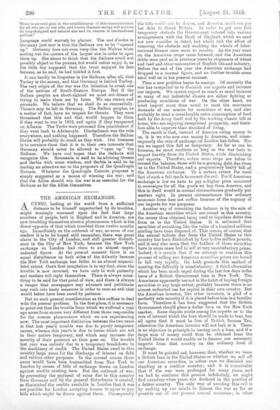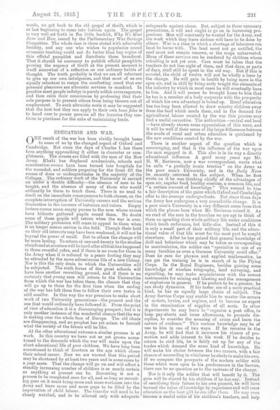THE AMERICAN EXCHANGES.
ACYNIC, looking at the world from a sufficient distance to be himself unperturbed by its troubles, might musingly comment upon the fact that large numbers of people, both in England and in America, are now troubling themselves about a phenomenon which is the direct opposite of that which troubled them twelve months ago. Immediately on the outbreak of war, as some of our readers it is to be hoped still remember, there was great alarm in the City of London, and still greater disturb- ance in the City of New York, because the New York exchange on London had risen to an almost unpre- cedented figure. At the present moment there is an equal disturbance on both sides of the Atlantic because the New York exchange has fallen to an almost unparal- leled extent. One's first temptation is to say that, since the trouble is now reversed, we have only to wait patiently and matters will right themselves. There is always some- thing to be said for that point of view, and there is always a danger that newspapers may advocate and politicians may rush into hasty measures in order to cure an evil that would better have been cured by patience.
But no such general consideration as this suffices to deal with the present problem. In the first place, it is necessary to point out that the trouble from which we suffered a year ego arose from causes very different from those responsible for the reverse phenomenon which we are experiencing now. The most important distinction between the two cases is that last year's trouble was due to purely temporary causes, whereas this year's is due to forces which are not in their nature temporary, and which may increase the severity of their pressure as time goes on. The trouble last year was entirely due to a temporary breakdown in the machinery of credit. The United States owed to this country large sums for the discharge of interest on debt and various other purposes. In the normal course these sums would have been transmitted from Now York to London by means of bills of exchange drawn on London against credits existing here. But the outbreak of war, by preventing the payment of sums due to this country from Germany and by the general disturbance it created, so diminished the credits available in London that it was not possible for London accepting houses to agree to pay bills which might be drawn against them. Consequently the bills could not bo drawn, and America could not paw her debt to Great Britain. In order to got over this temporary obstacle the Government entered into various arrangements with the Bank of England, which we need not now consider in detail, but which had the effect of removing the obstacle and enabling the wheels of inter- national finance once more to revolve. As the year went on the American crops came forward, and the American debts were paid as in previous years by shipments of wheat and beef and other necessaries of English life and industry. Before the end of the year the American exchange had dropped to a normal figure, and no further trouble arose until well on in the present summer.
Then a now problem began to emerge. Of necessity the war has compelled us to diminish our exports and increase our imports. We cannot export as much as usual because so many of our industrial classes are either fighting or producing munitions of war. On the other hand, we must import more than usual to meet the enormous demands of our armies for munitions of war, and also probably to meet a considerable extra consumption of food both by the Army itself and by the working classes left at home, who are enjoying exceptional prosperity, and there- fore able to improve their standard of living.
The result is that, instead of America owing money to us, it is we who now owe money to America, and conse- sequently the rate of exchange on London has fallen. Nor can we regard this fall as temporary. As far as can be foreseen, we must continue as long as the war lasts to import heavily from the United States, while diminishing our exports. Therefore, unless some steps are taken to correct the balance, there will be a growing debt due from us to the United States, and a progressively heavy fall of the American exchange. To a certain extent the mere fact of such a fall tends to correct the evil. For if American exchange is low we have to pay a higher price measured in sovereigns for all the goods we buy from America, and this in itself would in normal circumstances gradually put matters right. In present circumstances this ordinary economic force does not suffice because of the urgency of our imports for war purposes.
Another way of correcting the balance is by the sale of the American securities which are owned in this country, the money thus obtained being used to liquidate debts due from us to the United States. It is estimated that securities of something like the value of a hundred millions sterling have boon disposed of. This means, of course, that the annual tribute due from the United States to this country has been diminished by four to five million pounds, and it may also moan that the holders of these securities have in some cases bad to sell at very unsatisfactory prices. Indeed, it is certain that if we attempt to continue this process of selling our American securities prices are bound to fall very rapidly. On both grounds this method of meeting the difficulty is unsatisfactory. A third alternative which has been much urged during the last few days is the issue of a British Government loan in New York. The Americans apparently are not in the habit of buying foreign securities to any large extent, probably because there is an almost unlimited use for capital in their own country. But the American investor, like other investors, is glad of a, perfectly safe security if it is placed before him in a familiar form. Therefore it has been suggested that the 13ritish Government should place a dollar loan on tho New York market. Some dispute exists among the experts as to the rate of interest which the loan should be made to bear, but all agree that it must be free of British Income Tax, otherwise the American investor will not look at it. There is uo objection in principle to issuing such a loan, and if a. large sum of money could thus be obtained from the United States it would enable us to finance our necessary imports from that country on the ordinary level of exchange. It must be pointed out, however, that, whether we issue a British loan in the United States or whether we sell off our American securities, in either ease we diminish our i standing as a creditor country ; and it is conceivable that if the war were prolonged for many years, and we had to continuo this process indefinitely, we might find ourselves when peace was declared in tho position of a debtor country. The only way of avoiding this evil is by making up our minds to finance the war 1:13 far as possible out of our present annual resources ; in other words, we get back to the old gospel of thrift, which is at last beginning to come into fashion again. The gospel is very well set forth in fhe little booklet, Why We Must Save and How, issued by the Parliamentary War Savings Committee. The whole case is there stated with admirable lucidity, and any one who wishes to popularize sound economic teaching could not do better than buy copies of this official pamphlet and distribute them broadcast. That it should be necessary to publish official pamphlets proving the urgency of thrift at the present moment is itself somewhat of a reflection on our ordinary habits of thought. The truth probably is that we are all reluctant to give up our own indulgences, and that most of us are equally reluctant to resign the comforting creed that our personal pleasures are altruistic services to mankind. In practice most people indulge in purely selfish extravagances, and then calm their consciences by professing that their sole purpose is to prevent others from being thrown out of employment. To such altruistic souls it may be suggested that the best test they can apply to their own bona fides is to hand over to poorer persons all the luxuries they con- tinue to purchase for the sake of maintaining trade.



































 Previous page
Previous page